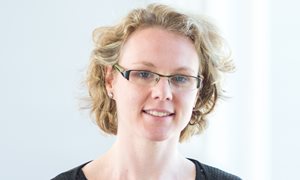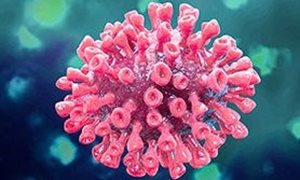 My name is Febrina Meutiawati and I am Indonesian. I’m currently pursuing my PhD in Medical Microbiology Department, at the Experimental Virology Group, Theme Infectious diseases and global health.
My name is Febrina Meutiawati and I am Indonesian. I’m currently pursuing my PhD in Medical Microbiology Department, at the Experimental Virology Group, Theme Infectious diseases and global health.
When you were a kid what did you want to be when you grew up? Can you tell us something about your child years.
Since my mother is a teacher in physics, being a teacher was one of my dreams. Besides that, I remembered that I was more interested in life science subjects rather than social and literature subjects. However, as a kid, I was clueless on what scientists do. I only knew one scientist (sadly, a fictional character), dr. Dana Scully. Thanks to the TV series, I gained my interest to the scientific world.
What was your previous academic training, where did you study and why that study?
I got my Bachelor and Master degree on Chemistry and Biochemistry from Bandung Institute of Technology. I was impressed by the scope of chemistry subject which is basically related to everything; physics, biology, medicine and even sometimes philosophy. Therefore, I chose to study the subject. Over time, my interest was more focus on molecular biology and was broaden to virology because there I can understand the molecular mechanism of disease in general, and viruses in specific. Moreover, cell culture works and plaque assays are quite exciting!
The RIMLS motto is: ‘Today’s molecules for tomorrow’s medicine’. What does this mean for you?
The motto basically represents the general topic of my PhD projects of which focus on discovery of antiviral drugs for mosquito-borne viruses. Our approach is by repurposing the collection of small drug-like compounds for antiviral activity screening to identify ones that inhibit dengue virus. Therefore, for me personally, this means every data matters, no experiment goes in vain. Our today’s pointless results may become very useful someday.
Who is your great example as scientists? And please give a motivation why.
I actually use everyone as great examples, and as scientists, I learned a lot from my supervisors and colleagues. However, I am greatly motivated by Dr. Angelle Desiree LaBeaud because she’s one of the myth-breakers of motherhood in science. This year, she received a Woman in Science Award given by International Society of Antiviral Research for her contribution in investigating the epidemiology of arboviral infection, in particular her dedication in arbovirus research in Kenya. From her experience, I can learn that there is a possibility to have an elevating career in science without having to choose between family and work.
Which research discovery that you have made has made you most proud?
I’m currently working on the discovery of novel antiviral drugs for dengue virus, one of the most pathogenic mosquito-borne virus. One discovery that I contributed to (of which i’m very proud of) is identification of the target from one of our antiviral drug candidates, posaconazole. Moreover, the host target that we identified was never been reported to be involved in dengue virus replication mechanism before. Therefore, besides identified the target of posaconazole for its inhibition activity against dengue virus, we also found a potential host target that can be a candidate for further antiviral drug development.
Given unlimited finance what experiment would you perform?
Of course, clinical trials of the dengue antiviral drug candidates that have been successfully characterized. Besides that, I’d like to build a research center focusing on antiviral drug screening and characterization on natural sources in Indonesia.
What does your working area (desk, office) look like and what does it say about you (or your research)?
It’s intermediate, I’d say. Not so tidy yet not so messy. I’m not entirely sure what it says about my research, though. However, if you happen to see my desk super clean, that means I’m either on holiday or in a serious stress.
Nominate a colleague to be in the spotlight and what would you like to ask him or her?
Bodine Bezemer. If you only have two options to survive in this world: listening to the whole album of Kensington every single day or make 100 types of replicon ….. stable cell lines, which one will you choose?
What type of person are you, quick insights:
a) Mac or PC? : Macb) Theater or cinema? : Cinema
c) Dine out or dine in? : Dine in
d) Ferrari or Fiat? : Neither
e) Shopaholic or chocoholic? : Shop-a-choco-holic
f) Culture or Nature : Nature
Related news items

Rebecca Halbach receives idea generator grant to fight mosquito transmitted viruses
8 July 2020Rebecca Halbach and Pascal Miesen have investigated in a collaborative project whether the treatment of mosquitoes with antiviral drugs can prevent the transmission of mosquito-transmitted viral diseases.
go to page
Invasive fungal infections in influenza and COVID-19
8 July 2020 The Aspergillus fungus is found in the lungs of many COVID patients. A parallel occurs with influenza patients, who often develop a serious fungal infection. Although such a serious fungal infection seems to occur less frequently in COVID-patients, alertness remains necessary, go to page
First clinical trial with genetically modified malaria vaccine completed
22 May 2020 In an innovative study, Radboudumc and LUMC jointly tested a candidate vaccine based on a genetically weakened malaria parasite. The results of this clinical trial, published in Science Translational Medicine, show that the vaccine is safe and elicits a defense response against a malaria infection. go to page
New step in the development of a vaccine against malaria
22 May 2020 A new vaccine based on rodent malaria parasites achieved a 95% reduction in infection of the liver in humans. An international consortium publishes the results in Science Translational Medicine. go to page
Stuttering DNA orchestrates the start of the mosquito’s life
9 April 2020 A certain type of junk DNA that is found in mosquitoes and which repeats itself dozens of times, known as ‘satellite DNA’, has now been shown to play an essential role in the early development of mosquito embryos. Ronald van Rij and colleagues published their findings in Nature. go to page
NWO Open Competition Domain Science - XS grant for Ronald van Rij and Jenny van der Wijst
21 January 2020NWO Domain Science has awarded Ronald van Rij, theme Infectious diseases and global health and Jennny van der Wijst, theme Renal disorders an XS grant. The XS category emphatically strives to encourage curiosity-driven and bold research involving a relatively quick analysis of a promising idea.
go to page